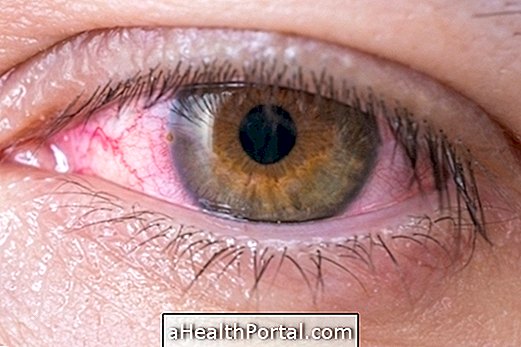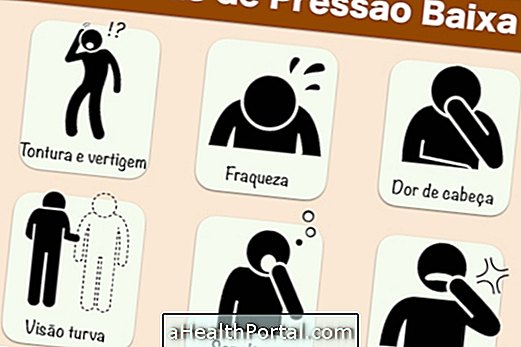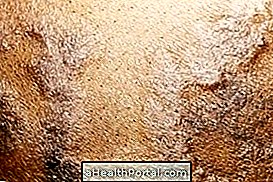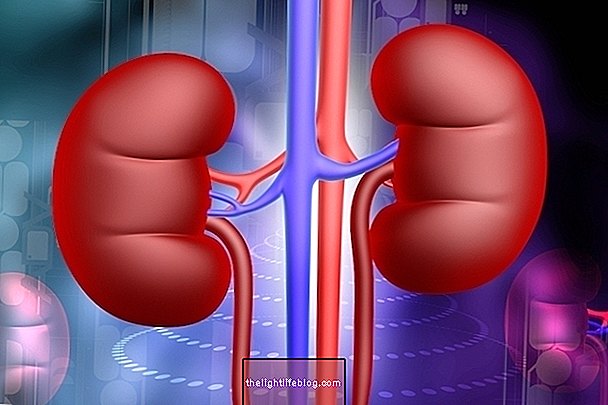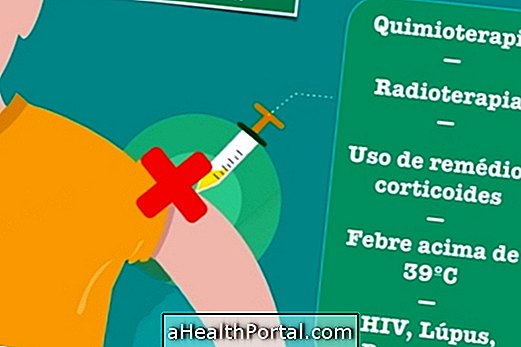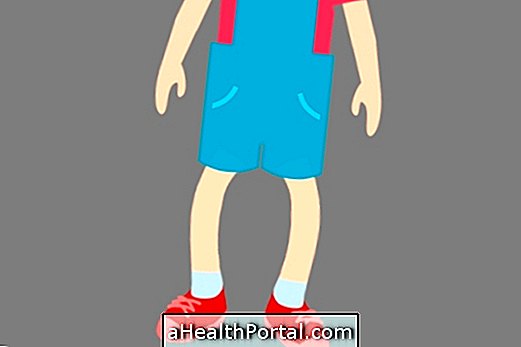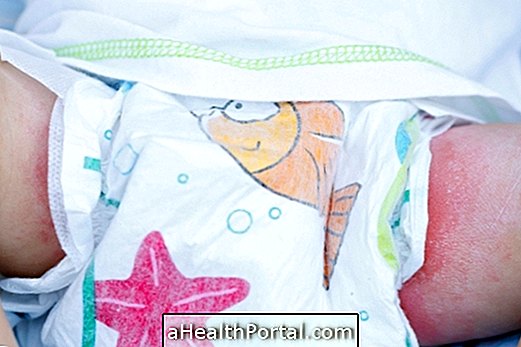Symptoms of Zika include low fever, pain in muscles and joints, redness of the eyes and red patches on the skin. The disease is transmitted by the same dengue mosquito, and symptoms usually appear 10 days after the bite.
Usually the transmission of the Zika virus occurs through the bite of Aedes Aegypti, but there are already cases of people who have contaminated others through sexual contact without a condom. One of the biggest complications of this disease occurs when the pregnant woman is contaminated with the virus, which can cause microcephaly, a serious neurological disease in her baby.
How to know if you have Zika virus
The symptoms of Zika are similar to those of Dengue, but the Zika virus is weaker and therefore the symptoms are milder and disappear within 4 to 7 days, however it is important to see a doctor to see if you are actually having Zika. Initially, the symptoms can be confused with a simple flu, causing:
1. Low fever
Low fever, which can vary between 37.8 ° C and 38.5 ° C, occurs because with the virus entering the body there is an increase in the production of antibodies and this increase raises the body temperature, so the fever should not be seen as being a bad thing, but it signals that antibodies are working to counter the invader.
How to relieve : In addition to the remedies indicated by the doctor it may be helpful to avoid very warm clothing, take slightly warm baths to adjust the skin temperature or place lightly cold cloths on the nape of the neck and underarms to lower body temperature.
2. Red spots on the skin
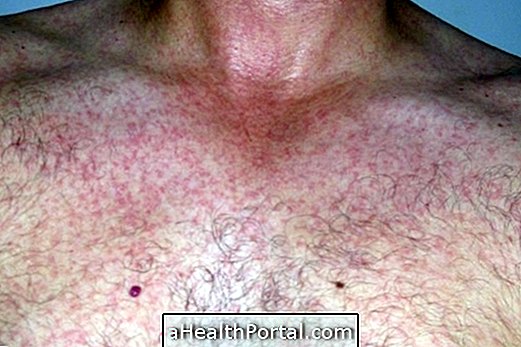
These occur throughout the body and are slightly elevated. They start on the face and then spread through the body and sometimes can be confused with measles or with dengue, for example. At the clinic, the lacing test can differentiate the symptoms of dengue, since the result will always be negative in the case of Zika. Unlike dengue Zika can not cause hemorrhagic complications.
3. Itching in the body
In addition to the small spots on the skin Zika also causes itchy skin in most cases, however the itching tends to decrease in 5 days and can be treated with antihistamines prescribed by the doctor.
How to relieve : Taking cold showers can also help relieve the itching. Applying masa potatoes or fine oats to the most affected areas can also help control this symptom.
4. Pain in joints and muscles

The pain caused by Zika affects all muscles of the body, and occurs mainly in the small joints of the hands and feet. In addition the region may become slightly swollen and reddish, as it also occurs in case of arthritis. The pain can be more intense when it moves, being stopped hurts less.
How to relieve : Medications like Paracetamol and Ibuprofen are helpful in relieving this pain but cold compresses can also help to relieve joint pain, relieving pain and discomfort, and should be rested whenever possible.
5. Headache
The headache caused by Zika mainly affects the part behind the eyes, the person may have the sensation that the head is throbbing, but in some people the headache is not very strong.
How to relieve : Putting compresses of cold water on the forehead and drinking warm chamomile tea can help relieve this discomfort.
6. Physical and mental fatigue
With the immune system acting against the virus, there is a greater energy expenditure and consequently the person feels more tired, with difficulty to move and to concentrate. This is a form of protection for the person to rest and the body can focus on fighting the virus.
How to relieve : You should rest as much as possible, drink plenty of water to facilitate the elimination of the virus and evaluate the possibility of not attending school or work.
7. Redness and tenderness in eyes

This redness is caused by increased periorbital blood circulation. Although it is similar to conjunctivitis there is no yellowish secretion, although there may be a slight increase in tear production. In addition, the eyes become more sensitive to daylight and it can be more comfortable to wear sunglasses.
Other less common symptoms include gastrointestinal disorders such as thrush, abdominal pain, nausea, vomiting, diarrhea, or constipation. Sore throat also occurs in some people, although it is less frequent. If you have any of these symptoms, read: How to know if you have Zika virus.
In about 80% of cases, Zika does not cause any symptoms and is therefore called asymptomatic. It is believed that people who do not manifest symptoms of Zika have a stronger immune system and therefore do not get to present symptoms related to the disease.
Transmission of Zika virus
The Zika virus is transmitted to humans through bites of the Aedes Aegypti mosquito, which usually sting in the late afternoon and evening.

The virus can pass from mother to child during pregnancy causing a serious illness called microcephaly, and also through sexual intercourse with people who have the disease. In addition, there is also the suspicion that Zika can be passed through breast milk, causing the baby to develop the symptoms of Zika and also through saliva, but these hypotheses are not confirmed and appear to be very rare.
If you are pregnant or breastfeeding talk to your doctor and follow all the guidelines. Here's how Zika can affect pregnancy.
The Zika virus is from the same family as the cause of Dengue fever and Chikungunya fever, causing similar but less intense symptoms, but its consequences can be very serious.
Remedies to treat Zika
The treatment for Zika virus is very similar to that of dengue, however, in case of Zika virus, the doctor may indicate the use of the following medicines:
- Analgesics such as Paracetamol or Dipyrone, every 8 hours to combat pain and fever;
- Anti-inflammatory drugs such as Ibuprofen every 8 hours to decrease joint and muscle pain;
- Anti-allergic agents such as Loratadine, Cetirizine or Hydroxyzine to relieve redness in the skin, eyes and itching of the body;
-
Lubricating eye drops like Moura Brazil, to apply to the eyes 3 to 6 times a day.
In addition to the remedies, it is important to rest for 7 days and make a diet rich in vitamins and minerals, and drink plenty of water, to recover faster.
If it is your baby who is with Zika, it may be a bit trickier to identify the symptoms, so be aware of the signs that it may present as fever and irritability, the treatment in babies is slightly different. See How to treat your baby with zika.
In addition, remedies containing acetylsalicylic acid should not be used, just as occurs in case of dengue because they may increase the risk of bleeding. See examples of remedies contraindicated in these two diseases in: Remedies for dengue.
Azithromycin in pregnancy
The antibiotic Azithromycin is in phases of studies to be used in women as a way to combat the Zika virus and prevention of microcephaly in the baby.
It is believed that this antibiotic can be used in pregnant women with Zika and also in women who are trying to get pregnant because they may already be pregnant and do not yet know. However, this possibility is still found in studies and should be discussed with the obstetrician before starting to be used. Check the contraindications of Azithromycin.
Watch the video to know how to protect yourself from Aedes Aegypti :

Complications of Zika virus
Although Zika is usually milder than dengue, complications such as microcephaly may occur in some people in infants of infected women in pregnancy and Guillain-Barré syndrome, for example. Understand how Zika can be serious.
Therefore, if in addition to the typical symptoms of Zika, the person presents some alteration or aggravation of the symptoms should go to the doctor as soon as possible to perform tests that can confirm these other diseases.
Learn what the myths and truths about zika virus are and ask questions.
